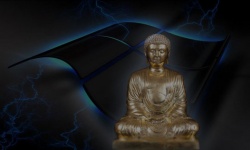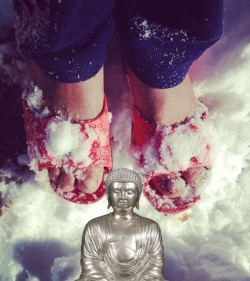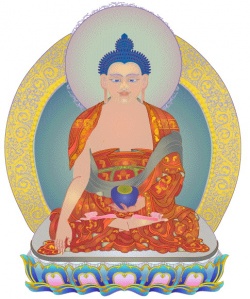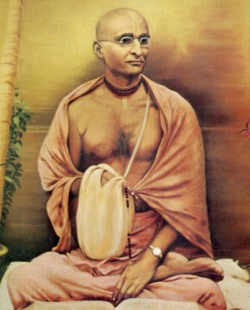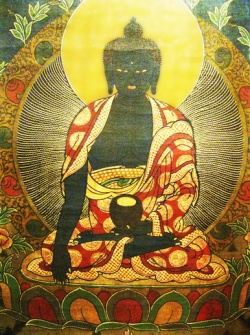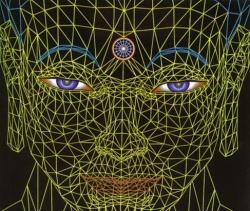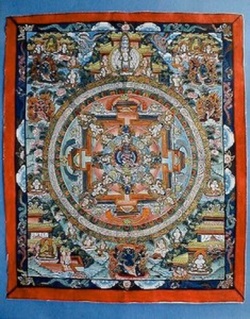Mahasupina Jataka: The Sixteen Dreams
One morning, when the ministers and brahmans went to the palace to pay their respects to King Pasenadi, the King of Kosala, and to inquire whether His Majesty had slept well, they found him lying in terror, unable to move from his bed.
"How could I sleep well?" exclaimed the king. "Just before daybreak I dreamed sixteen incredible dreams, and I have been lying here terrified ever since! Since you are my advisors, tell me what these dreams mean."
"What were your dreams, sire?" the brahmans asked. "Surely we will be able to judge their importance."
As the king was telling them his dreams, the brahmans looked very worried and began wringing their hands.
"Why are you wringing your hands, brahmans?" asked the king. "Is it because of my dreams?"
"Yes, sire. These are evil dreams. They are full of peril."
"What will come of them?" asked the king.
"They portend one of three calamities, sire — great harm to your kingdom, to your wealth, or to your life."
"Is there any remedy?"
"These dreams are powerful and extremely threatening. Still, we will find a remedy, otherwise what is the use of our vast study and learning?"
"How do you propose to avert the evil?" asked the king.
"Wherever four roads meet, we will offer appropriate sacrifices, sire."
"My advisors," cried the king. "My life is in your hands! Hurry and do your best to save me!"
Each of the exultant brahmans had the same thought: "We are going to make a fortune from these dreams. Soon we will feast on the choicest foods."
As soon as they had left the king's presence, they began scurrying about, happily giving orders in every direction. They ordered laborers to dig huge sacrificial pits. They demanded herds of various four-footed creatures, all without blemish. They called for baskets of pure white birds of many kinds. Again and again, they discovered something or other lacking. Messengers raced back and forth to inform the king of each new request.
Noticing all the commotion, Queen Mallika went to the king and asked why the brahmans and their servants kept coming to him.
"I envy you," said the king sarcastically. "A snake in your ear, and you don't even know it!"
"What does your majesty mean?" asked the queen.
"I have dreamed such unlucky dreams! The brahmans tell me they point to disaster. They keep coming here because they are anxious to protect me from the evil by offering sacrifices."
"Has your majesty consulted the Chief Brahman of all the worlds about this?" asked the queen.
"Who do you mean, my dear?" asked the king.
"Of course, I mean Lord Buddha. He will surely understand your dreams. Go to Jetavana and ask him."
"A good idea, my queen," answered the king. "I will go at once."
When the king reached the monastery, he paid his respects to the Buddha and sat down.
"What brings your majesty here so early in the morning?" asked the Buddha.
"Just before daybreak, venerable sir, I dreamed sixteen terrifying dreams. My brahmans have warned me that my dreams foretell calamity. To avert the evil, they are preparing to sacrifice many animals wherever four roads meet. Queen Mallika suggested that I ask you to tell me what these dreams really mean and what will come of them."
"It is true, sire, that I alone can explain the significance of your dreams and tell you what will come of them. Tell me your dreams as they appeared to you."
"I will, Blessed One," answered the king, and he began relating his dreams.
"In the first dream, I saw four jet-black bulls," the king began. "They came together from the four cardinal directions to the royal courtyard with every intention to fight. A great crowd of people gathered to see the bullfight. The bulls, however, only made a show of fighting, pawing and bellowing. Finally, they went off without fighting at all. This was my first dream. What will come of it?"
"Sire, that dream will have no result in your lifetime or mine. But in the distant future, when kings are stingy, when citizens are unrighteous, when the world is perverted, and when good is waning and evil waxing, in those days of the world's decline, no rain will fall from the heavens, the monsoons will forget their season, the crops will wither, and famine will stalk the land. At that time immense clouds will gather from the four quarters of the heavens as if for rain. Farmers will rush to bring in the rice they had spread to dry in the sun. Men will take their spades and hurry to repair the dikes. The thunder will roar, and the lightning will flash from the clouds. However, just as the bulls in your dream didn't fight, these clouds will retreat without giving any rain. This is what shall come of this dream. But no harm shall come to you from this dream because it applies only to the remote future. The brahmans only said what they said to get some profit for themselves. Now tell me your second dream, sire."
"My second dream was about tiny trees and shrubs which burst through the soil. When they were scarcely more than a few inches high, they flowered and bore fruit. This was my second dream. What will come of it?"
"Sire," said the Buddha, "this dream will be realized in future days when the world has fallen into decay and when human lives are short. Passions then will be so strong that even very young girls will cohabitate with men. Despite their immaturity, they will get pregnant and have children. The flowers and fruit symbolize their babies. However, you have nothing to fear from this. Tell me your third dream."
"I saw cows sucking milk from their very own newborn calves. This was my third dream. What can it possibly mean?"
"This dream will come about only when age is no longer respected. In that future time young people will have no regard for their parents or parents-in-law. Children will handle the family estate themselves. If it pleases them, they will give food and clothing to the old folks, but, if it doesn't suit them, they will withhold their gifts. Thus the old people, destitute and dependent, will survive only by the favor and whim of their own children, like big cows suckled by day-old calves. However, you have nothing to fear from this. Tell me your fourth dream."
"Men unyoked a team of strong, sturdy oxen, and replaced them with young steers, too weak to draw the load. Those young steers refused to pull. They stood stock-still, so that the wagons didn't move at all. This was my fourth dream. What will come of it?"
"Here again the dream will not come to pass until the future, in the days of wicked kings. In days to come, unjust and parsimonious kings will show no honor to wise leaders, skilled in diplomacy. They will not appoint experienced, learned judges to the courts. On the contrary, they will honor the very young and foolish, and will appoint the most inexperienced and unprincipled to the courts. Naturally, these appointees, because of their ignorance of statecraft and the law, will not be able to bear the burden of their responsibilities. Because of their incompetence they will have to throw off the yoke of public office. When that happens, the aged and wise lords will remember being passed over, and, even though they are able to cope with all difficulties, they will refuse to help, saying: 'It is no business of ours since we have become outsiders.' They will remain aloof, and the government will fall to ruins. It is just like when the young steers, not strong enough for the burden, were yoked instead of the team of sturdy oxen. However, you have nothing to fear from this. Tell me your fifth dream."
"I saw an incredible horse with a mouth on each side of its head being fed fodder on both sides. That dreadful horse ate voraciously with both its mouths. This was my fifth dream. What will come of it?"
"This dream will also come true only in the future, in the days of unrighteous and irresponsible kings, who will appoint covetous men to be judges. These despicable magistrates, blind to virtue and honesty, will take bribes from both sides as they sit in the seat of judgment. They will be doubly corrupt, just like the horse that ate fodder with two mouths at once. However, you have nothing to fear from this. Tell me your sixth dream."
"I saw people holding out a brightly burnished golden bowl which must have been worth a fortune. They were actually begging an old jackal to urinate in it. Then I saw the repulsive beast do just that. This was my sixth dream. What can it mean?"
"This dream too will come to be only in the remote future, when immoral kings, although from a royal line themselves, will mistrust the sons of their old nobility, preferring instead the lowest-born of the country. Because of the kings' blindness, nobles will decline, and the low-born will rise in rank. Naturally, the great families will give their daughters to them in marriage. The union of the noble maidens with the ignoble, nouveau-riche will be like the pissing of the old jackal into the golden bowl. However, you have nothing to fear from this. Tell me your seventh dream."
"I saw a man braiding rope. As he worked, he dropped the finished rope at his feet. Under his bench, unknown to him, lay a hungry jackal bitch, which kept eating the rope as fast as he braided it. This was my seventh dream. What shall come of it?"
"This dream also will happen only in far off days. At that time women will crave men, strong drink, extravagant clothes, jewelry, and entertainment. In their profligacy these women will get drunk with their lovers and carry on shamelessly. They will neglect their homes and families. They will pawn household valuables, selling everything for drink and amusements, even the seed needed for the next crop. Just as the hungry jackal under the bench ate the rope of the rope-maker, so these women will squander the savings earned by their husbands' labor. However, you have nothing to fear from this. Tell me your eighth dream."
"At a palace gate there stood a big pitcher full to the brim. Around it stood many empty pitchers. From all directions there came a steady stream of people carrying pots of water which they poured into the already full pitcher. The water from that full pitcher kept overflowing and wastefully soaking into the sand. Still the people came and poured more and more water into the overflowing vessel. Not a single person even glanced at the empty pitchers. This was my eighth dream. What shall come of it?"
"This dream too will not come to pass until the future when the world is in decline. The kingdom will grow weak, and its kings will be poorer and more demanding. These kings in their poverty and selfishness will make the whole country work exclusively for them. They will force citizens to neglect their own work and to labor only for the throne. For the kings' sake they will plant sugar cane, make sugar-mills, and boil down molasses. For the kings' sake they will plant flower gardens and orchards and gather fruits. They will harvest all the crops and fill the royal storerooms and warehouses to overflowing, but they will be unable even to glance at their own empty barns at home. It will be like filling and overfilling the full pitcher, heedless of the needy, empty ones. However, you have nothing to fear from this. Tell me your ninth dream."
"I saw a deep pool with sloping banks overgrown with lotuses. From all directions, a wide variety of animals came to drink water from that pool. Strangely, the deep water in the middle was terribly muddy, but the water at the edges, where all those thirsty creatures had descended into the pool, was unaccountably clear and sparkling. This was my ninth dream. What does it mean?"
"This dream too will not come to pass until the future, when kings grow increasingly corrupt. Ruling according to their own whim and pleasure, they will never make judgments according to what is right. Being greedy, they will grow fat on lucrative bribes. Never showing mercy or compassion to their subjects, they will be fierce and cruel. These kings will amass wealth by crushing their subjects like stalks of sugar cane in a mill and by taxing them to the last penny. Unable to pay the oppressive taxes, the citizens will abandon their villages, towns, and cities, and will flee like refugees to the borders. The heart of the country will be a wilderness, while the remote areas along the borders will teem with people. The country will be just like the pool, muddy in the middle and clear at the edges. However, you have nothing to fear from this. Tell me your tenth dream."
"I saw rice boiling in a pot without getting done. By 'not getting done' I mean that it looked as though the cooking was going on in three distinct stages which were sharply delineated and separate from each other. One part of the rice was sodden, another part was hard and raw, and the third part looked like it was perfectly cooked. This was my tenth dream. What will come of it?"
"This dream too will not be fulfilled until the future. In days to come kings will become unrighteous; the nobles will follow the king's example, and so will the brahmans. The townsmen, the merchants, and at last even the farmers will be corrupted. Eventually, everyone in the country, the sages and even the gods of the land, will become immoral. Even the winds that blow over the realm of such an unrighteous king will grow cruel and lawless. Because even the skies and the spirits of the skies over that land will be disturbed, they will cause a drought. Rain will never fall on the whole kingdom at once. It may rain in the upper districts, but in the lower it will not. In one place a heavy downpour will damage the crops, while in another area the crops will wither from drought. The crops sown within a single kingdom — like the rice in the one pot — shall have no uniform character. However, you have nothing to fear from this. Tell me your eleventh dream."
"I saw rancid buttermilk being bartered for precious sandalwood worth a fortune in gold. This was my eleventh dream. What shall come of it?"
"This will happen only in the distant future, when my teaching is waning. In those days, there will be many greedy, shameless bhikkhus, who for the sake of their bellies dare to preach the very words in which I have warned against greed! Because they desert the Truth to gratify their stomachs, and because they sided with sectarians, their preaching will not lead to Nibbana. Their only thought as they preach will be to use fine words and sweet voices to induce lay believers to give them costly robes, delicate food, and every comfort. Others will seat themselves beside the highways, at busy street corners, or at the doors of kings' palaces where they will stoop to preach for money, even for a pittance! Thus these monks will barter away for food, for robes, or for coins, my teaching which leads to liberation from suffering! They will be like those who exchanged precious sandalwood worth a fortune in pure gold for rancid buttermilk. However, you have nothing to fear from this. Tell me your twelfth dream."
"I saw dried gourds sinking in the water. What shall come of it?"
"This dream also will not have its fulfillment until the future, in the days of unjust kings, when the world is perverted. In those days kings will favor the low-born, not the sons of nobility. The low-born will become great lords, while the nobles will sink into poverty. In the king's court and in the courts of justice, the words of the low-born alone will be recognized, so that they, like the dried gourds, will be firmly established. In the assemblies of monks it will be the same. Whenever there are enquiries about proper behavior, rules of conduct, or discipline, only the counsel of wicked, corrupt monks will be considered. The advice of modest monks will be ignored. It will be as when the empty pumpkins sank. However, you have nothing to fear from this. Tell me your thirteenth dream."
Then the king said, "I saw huge blocks of solid rock, as big as houses, floating like dried gourds upon the waters. What shall come of it?"
"This dream also will not come to pass until those times of which I have spoken. At that time unrighteous kings will show honor to the low-born, who will become great lords, while the true nobles will fade into obscurity. The nobles will receive no respect, while the ignorant upstarts will be granted all honors. In the king's court and in the law courts, the words of the nobles, learned in the law, will drift idly by like those solid rocks. They will not penetrate deep into the hearts of men. When the wise speak, the ignorant will merely laugh them to scorn, saying 'What is it these fellows are saying?' In the assemblies of monks as well, people will not respect the excellent monks. Their words will not sink deep, but will drift idly by, the same as the rocks floating on the water. However, you have nothing to fear from this. Tell me your fourteenth dream."
"I saw tiny frogs, no bigger than miniature flowerets, swiftly pursuing huge black snakes and devouring them. What can this mean?"
"This dream too will not have its fulfillment until those future days of which I have already spoken, when the world is declining. At that time men's passions will be so strong that husbands will be thoroughly infatuated with their childish wives. Men will lose all judgment and self-respect. Being completely smitten, they will place their infantile wives in charge of everything — servants, livestock, granaries, gold and silver, everything in the house. Should the over-fond husband presume to ask for some money, or for a favorite robe, he will be told to mind his own business, and not to be so inquisitive about property in her house. These abusive young wives will exercise their power over their husbands as if the men were slaves. It will be like the tiny frogs which gobbled up the big black snakes. However, you have nothing to fear from this. Tell me your fifteenth dream."
"I saw a village crow, a vile creature with all the ten vices,[1] attended by an entourage of Mandarin ducks, beautiful birds with feathers of golden sheen. What shall come of it?"
"This dream too will not come to pass until the far distant future, in the reign of weakling kings. Then there will be kings who know nothing about ruling. They will be cowards and fools. Fearing revolt and revolution, they will elevate their footmen, bath-attendants, and barbers to nobility. These kings will ignore the real nobility. Cut off from royal favor and unable to support themselves, bona fide nobles will be reduced to dancing attendance on the upstarts, as when the crow had regal Mandarin ducks for his retinue. However, you have nothing to fear from this. Tell me your sixteenth dream."
"I saw goats chasing wolves and eating them. At the sight of goats in the distance, the wolves fled terror-stricken, quaking with fear to hide in thickets. Such was my dream. What will come of it?"
"This dream too will not have its fulfillment until the reign of immoral kings. The low-born will be raised to important posts and will become royal favorites. True nobles will sink into obscurity and distress. Gaining power in the law courts because of the king's favors, the parvenu will claim the ancestral estates of the impoverished old nobility, demanding their titles and all their property. When the real nobles plead their rights in court, the king's minions will have them beaten and tortured, then taken by the throat and thrown out with words of scorn. 'That will teach you to know your place, fools!' they will shout. 'How dare you dispute with us? The king shall hear of your insolence, and we will have your hands and feet chopped off!' At this, the terrified nobles will agree that black is white and that their own estates belong to the lowly upstarts. They will then hurry home and cower in an agony of fear. Likewise, at that time, evil monks will harass good, worthy monks until the worthy ones flee from the monasteries to the jungle. This oppression of true nobles by the low-born and of good monks by the evil monks will be like the intimidation of wolves by goats. However, you have nothing to fear from this. This dream refers to the future only."
When he had thus reassured the king, the Buddha added: "It was neither truth nor love for you that prompted the brahmans to prophesy as they did. It was pure greed and selfishness that led them to prescribe sacrifices."
Thus the Buddha explained the meaning of the sixteen dreams. Then he said, "Nor are you the first to have had these dreams. They were dreamed by kings of bygone days as well. Then, as now, brahmans found in them a pretext for sacrifices."
At the king's request, the Buddha told this story of the past.
Long, long ago, when Brahmadatta was reigning in Baranasi, the Bodhisatta was born into a brahman family in the North country. When he grew up, he renounced the world and became a hermit. Having attained a high level of meditation, he acquired supernatural powers.
One day, King Brahmadatta dreamed sixteen mysterious dreams and asked his advisors about them. The brahmans explained that the dreams foretold evil and began preparing great sacrifices. Seeing this, one of the pupils of the chief brahman, a young man of considerable learning and wisdom, approached his teacher, and said, "Master, you have taught me the Three Vedas. Don't the texts say that it is never a good thing to take life?"
"My dear boy," answered the teacher, "this means money to us — a great deal of money. Why are you anxious to spare the king's treasury?"
"Do as you will, Master," replied the young man. "I will no longer stay here with you." With those words he left the palace and went to the royal gardens.
That same morning the Bodhisatta had thought to himself, "If I visit the king's garden today, I will save a great number of creatures from death."
The young brahman found the ascetic radiant as a golden image sitting on the king's ceremonial stone seat in the garden. He sat down in an appropriate place, paid respect to the hermit, and entered into pleasant conversation with him. The hermit asked the young man if he thought the king ruled righteously.
"Sir," he answered, "the king himself is righteous, but the brahmans are leading him astray. The king consulted with them about sixteen dreams he had, and the brahmans jumped at the opportunity for sacrifices. Venerable sir, how good it would be for you to explain to the king the real meaning of his dreams! Your explanation will save many animals from cruel death!"
"I do not know the king, nor does he know me. If he comes here and asks me, however, I will tell him."
"Please wait here, sir. I will bring the king," said the young brahman. He hurried to the king and told him there was a wondrous ascetic who would interpret the dreams. He asked the king to visit the ascetic and talk with him.
The king immediately agreed and went to the garden with his retinue. Paying his respects to the ascetic, he sat down and asked if the ascetic could tell him what would come of his dreams.
"Certainly, sire," he answered. "Let me hear the dreams as you dreamed them."
The king proceeded to tell the dreams exactly as King Pasenadi told them to the Buddha.
"Enough!" said the Bodhisatta. "You have nothing to fear from any of these dreams."
Having reassured the king and having freed a great number of creatures from death, the hermit, poised in midair, taught the king how to observe the Five Precepts and concluded by saying, "From this time on, sire, do not join the brahmans in slaughtering animals for sacrifice!"
Remaining firm in the teaching he had heard and spending the rest of his days in alms-giving and other good works, the king passed away to fare according to his deserts.
His lesson ended, the Buddha said, "Sire, you too have nothing to fear from these dreams. Stop the sacrifice!" Then the Buddha identified the Birth by saying, "Ananda was the king of those days, Sariputta was the young brahman, and I was the ascetic."
Footnotes
- ↑ The crow is: destructive, reckless, greedy, gluttonous, rough, merciless, weak, noisy, forgetful, and wasteful.
Source
"Jataka Tales of the Buddha: Part IV", retold by Ken & Visakha Kawasaki. Access to Insight (Legacy Edition), 30 November 2013, http://www.accesstoinsight.org/lib/authors/kawasaki/bl144.html .
